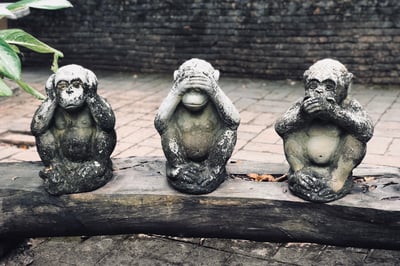Jargon – special words or expressions used by a profession or group that are difficult for others to understand.
Definition by Oxford Dictionaries
As a consumer, how many times have you registered for a “risk-free trial” thinking that you actually made a great deal, because you can return the product easily in case you don’t like it? For us price-conscious consumers, we don't require too much time to understand what this “risk-free” or any other similar terms mean both for ourselves and for the company. What is the commitment that we make as a buyer? Marketing campaigns are always full of industry jargon and it is often either misunderstood or simply remains unclear to the audience even after the purchase. Not to mention, it kills conversions … but wait, what are conversions? Oops, jargon again.
Advertising jargon, marketing jargon…
As long as you don’t find yourself in a situation that you need to negotiate with a group of determined lawyers, or discuss your product’s technical issues with a factory, you don’t really need to worry about their industry jargon. You are not exposed to it every day and it doesn’t affect you. Many professionals can freely use their industry lingo within their work environment. However, when they are talking to someone from a different industry they'll need to put their ideas in simpler words. That, however, is not the case when it comes to marketing and advertising.
 What is the difference? Most marketing messaging, as well as advertisements are not intended for industry professionals. Unless it’s an internal discussion, you are simply not the recipients of the words your marketing team comes up with in an attempt to communicate with the outside world. On the contrary, the real recipients often have nothing to do with marketing and advertising and are not familiar with the jargon that they are being exposed to. The real recipients are people who read promotional posts, watch and listen to advertisements, respond to personal information forms on web pages. Be it on purpose or not, marketers tend to put many industry-specific terms in their messaging and often make people confused.
What is the difference? Most marketing messaging, as well as advertisements are not intended for industry professionals. Unless it’s an internal discussion, you are simply not the recipients of the words your marketing team comes up with in an attempt to communicate with the outside world. On the contrary, the real recipients often have nothing to do with marketing and advertising and are not familiar with the jargon that they are being exposed to. The real recipients are people who read promotional posts, watch and listen to advertisements, respond to personal information forms on web pages. Be it on purpose or not, marketers tend to put many industry-specific terms in their messaging and often make people confused.
Examples
Let’s look at some examples.
Our favorite one is “BOGO”. Unless you’re a marketer, you might not even know notice that this is actually an abbreviation. It’s the notorious “Buy One, Get One free”. Wait, it doesn’t necessarily express that!
It might as well be “Buy one, get the second one 50% off” or any other combination. Marketers juggle with it according to their needs, making less careful customers pay more than they planned to spend. Another infamous example is “Free*”. Yes, the asterisk is crucial here, because that little punctuation contains a long list of conditions set in very small letters. The product rarely turns out to be free, unless you comply with 150 different ridiculous conditions. But at the same time, you think – there must be someone who could meet those conditions and is missing out on the chance to get it cheaper … Finally, the example of landing pages.
Landing page is any Web page that a user arrives at after clicking a hyperlink.
Definition by Techopedia
 Inexperienced marketers seem to create landing pages for themselves and their colleagues only. There are two ways in which you can observe this. First, they talk about their product as if everybody clearly understands all of its features, payment plans and underlying technology. Let’s look at this phrase: “Alleviate your design pain”. What can it possibly mean to an e-commerce newbie who doesn’t even know how to bite this phrase? Second, since some marketers think that jargon can make their business look more professional, they use a lot of it throughout all of their profiles. The truth is that it results in the business sounding unapproachable instead. Moreover, some of them actually don’t know how to express what their company does with simple words, because they believe that it really is that complicated. And it probably is, but with a little dose of creativity, even the most complicated ideas can be explained to nearly everyone.
Inexperienced marketers seem to create landing pages for themselves and their colleagues only. There are two ways in which you can observe this. First, they talk about their product as if everybody clearly understands all of its features, payment plans and underlying technology. Let’s look at this phrase: “Alleviate your design pain”. What can it possibly mean to an e-commerce newbie who doesn’t even know how to bite this phrase? Second, since some marketers think that jargon can make their business look more professional, they use a lot of it throughout all of their profiles. The truth is that it results in the business sounding unapproachable instead. Moreover, some of them actually don’t know how to express what their company does with simple words, because they believe that it really is that complicated. And it probably is, but with a little dose of creativity, even the most complicated ideas can be explained to nearly everyone.
Unfortunately, the use of jargon makes the messaging appeal only to fellow experts – people who are least likely to make any purchases, because they probably don’t need it.
Incorporate these tips into your business
Hopefully these examples make consumers understand that they need to pay attention when they see an ad including “BOGO” or any other “tricks”, as well as noticing when the marketing messaging that they’re exposed to is pure jargon. Not their fault that they don’t understand what the brand wants to express. Moreover, the examples  above can help marketers realize that their audience is different from them and will not convince them to make a purchase with complex wording. They need a friendly, fresh language instead. Not only will it be more convincing to the customers, but also help the brand stand out of the crowd, as many companies incorporate jargon in their communication. It is not easy to translate difficult processes into easy descriptions – but as a marketer you have to learn this art. Don’t try to make your messaging sound better than it really is with jargon, because it probably won't pay off. People don’t google complicated terms – they google easy phrases instead, so why would you decrease the chances for your content to be googled?
above can help marketers realize that their audience is different from them and will not convince them to make a purchase with complex wording. They need a friendly, fresh language instead. Not only will it be more convincing to the customers, but also help the brand stand out of the crowd, as many companies incorporate jargon in their communication. It is not easy to translate difficult processes into easy descriptions – but as a marketer you have to learn this art. Don’t try to make your messaging sound better than it really is with jargon, because it probably won't pay off. People don’t google complicated terms – they google easy phrases instead, so why would you decrease the chances for your content to be googled?
Conclusion
Jargon is used widely across different marketing channels and in advertising. Even though some professionals firmly believe in its superpowers, this story is not real. The key to making consumers interested and your brand trustworthy is clear and true messaging – the craft of turning the complex into simple bites.

Digital advertising is evolving as quickly as online trends it lives and one of its biggest challenges is still the ad creation process itself. Advertising on Facebook, Instagram and with banners using poor quality visuals will not bring good results but might lead to losing a lot of money invested. It is important for marketers to understand good practices of digital ad making and make the best out of the opportunities it brings. You can read more about great digital ad characteristics here.